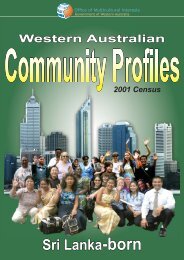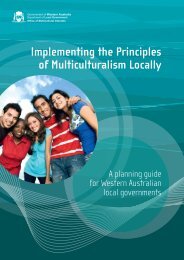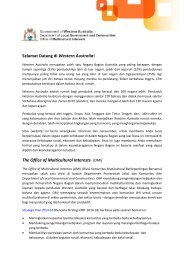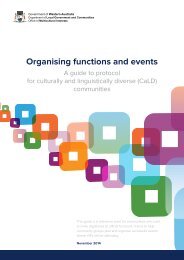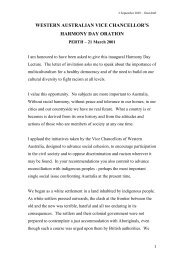Doing good by stealth, whilst flirting with racism - Office of ...
Doing good by stealth, whilst flirting with racism - Office of ...
Doing good by stealth, whilst flirting with racism - Office of ...
You also want an ePaper? Increase the reach of your titles
YUMPU automatically turns print PDFs into web optimized ePapers that Google loves.
and behaviour that is potentially 1<br />
ethnicity.<br />
accessible through the alternative language <strong>of</strong><br />
However, if the historical experience <strong>of</strong> contact <strong>with</strong> people <strong>of</strong> other cultures has<br />
provided Britain <strong>with</strong> a cultural and institutional capacity to recognise ethnic<br />
diversity; and to manage it through a racialised understanding <strong>of</strong> difference, it has also<br />
laid down a quite different edifice <strong>of</strong> belief and value that is relevant to our current<br />
circumstances. The British have a strand <strong>of</strong> self-belief and self-stereotyping that can<br />
be found rooted in the collective sense <strong>of</strong> the long continuity <strong>of</strong> Britain as a<br />
Parliamentary democracy. In the creative acts <strong>of</strong> selective retention and strategic<br />
myopia that goes into the building <strong>of</strong> a national identity, and the “invention <strong>of</strong><br />
tradition” (Hobsbawm and Ranger, 1983) the British have come to see themselves as<br />
blessed <strong>with</strong> an inherent decency. Notions <strong>of</strong> Britain the ‘mother <strong>of</strong> Parliaments’, <strong>of</strong><br />
being an historical haven for refugees and <strong>of</strong> having a distinctive capacity for<br />
tolerance, are part <strong>of</strong> this tradition. (Husband 1974,1987) That there are historical<br />
bases for these perceptions is important. Equally, a critical scrutiny <strong>of</strong> these claims<br />
would require a considerable exercise <strong>of</strong> qualification and suitable humility.<br />
However, the veracity <strong>of</strong> self-images is not the sole determining facet <strong>of</strong> their<br />
relevance. Their credibility is de facto more important than their truth, and their<br />
ubiquity as general ideas is more potent than knowledge <strong>of</strong> any supporting evidence.<br />
These ideas and values have in the past underpinned imperial expansion, as Britain<br />
“took up the White Man’s Burden”, and in the last decades they have been co-opted<br />
into the politics <strong>of</strong> negotiating the changing ethnic demography <strong>of</strong> Britain.<br />
A recurrent theme in the political discourse <strong>of</strong> managing the changing ethnic diversity<br />
<strong>of</strong> Britain has been an explicit concern <strong>with</strong> “maintaining harmonious community<br />
relations”. This liberal concern <strong>with</strong> guaranteeing tolerance and decency in interethnic<br />
interactions both draws upon and sustains this notion <strong>of</strong> British decency. It was<br />
classically invoked in the 1960’s when a Labour government sought to introduce<br />
immigration controls. In the 1965 words <strong>of</strong> the Labour politician, Roy Hattersley:<br />
1 Ethnicity is <strong>of</strong> course itself capable <strong>of</strong> reduction to rigid and inflexible usage; especially where<br />
essentialist notions <strong>of</strong> identity generate powerful policing <strong>of</strong> the processes <strong>of</strong> inclusion and exclusion<br />
from membership in an ethnic group. (Erikson, 1995)<br />
5





